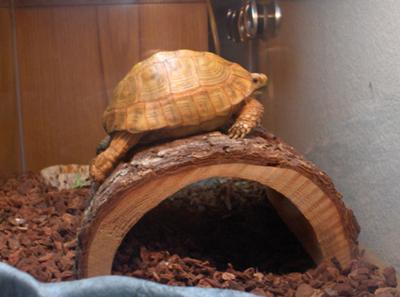Is my tortoise getting properly nourished?
by Desiree Dantona
(Minneapolis, MN, USA)

Hi there!
My name is Desiree Dantona, I'm 22 years old and I have had my Golden Greek Tortoise for 3 years now. I live in Minnesota where it can get very cold, and he is still quite small, so he spends most of his time in a 20 gallon terrarium with woodchip and rock bedding and a log for shelter. He comes out quite frequently and adventures around my apartment, eventually finding little nooks and crannies to fall asleep in.
My main question is regarding his diet and his growth. He seems very active, but I am concerned that he is not getting enough variety in his diet. He refuses to eat any pre-made "tortoise food" i can find in the store, so his entire diet is fresh vegetables/fruits.
Here is what I usually feed him:
-Green leaf lettuce
-Romaine hearts
-Yellow and green bell pepper
-tomato
-sometimes mustard greens
-sometimes bean sprouts
-sometimes carrot
-sometimes strawberries
He is actually kind of a picky eater and will not eat many foods including kale, red or orange bell peppers, banana, "cactus fruities," etc.
Also, i have read multiple places that tortoises should not be fed spinach because it interferes with their ability to absorb calcium, but the last blog I read had it listed multiple times as a main food source. Can I feed him spinach?
I have not measured or weighed him regularly since I got him, which I am realizing now was probably something I should have done. It seems to me that he has not grown much if at all since I got him. I
Secondly, his nails are beginning to get longer and I am not sure about how exactly to trim them. I looked it up online, but I am worried about cutting them too short and hurting him. Is this something I need to do for him and if so, how do I do it safely?
Thirdly, I noticed the other day that part of his shell was flaking/peeling off. It is a very small section, kind of resembling what dry skin would do if it flaked off in a bigger chunk. This is partially what made me so worried about malnourishment. Is this normal? Do I need to be using a supplement for him? I used to use a calcium supplement lotion on his shell, but I ran out over the summer and haven't started using it again.
In summary,
1.Is my tortoise getting fed properly?
2.Do I need to trim his nails and how?
3.Is shell flaking normal and should I use calcium supplement again?
I would really apreciate any insight on any of these questions. I feel a little in the dark about a lot of this and would love it if I had someone who maybe knew a little more about tortoises help to point me in the right direction so my tortoise can grow up healthy.
Thank you so much!
Desiree
Comments for Is my tortoise getting properly nourished?
|
||
|
||
|
||